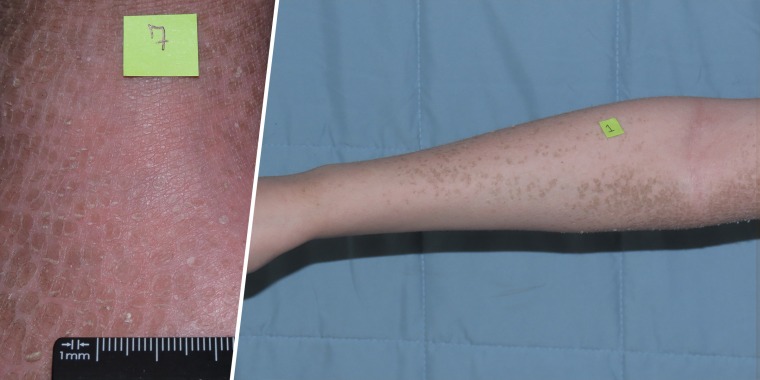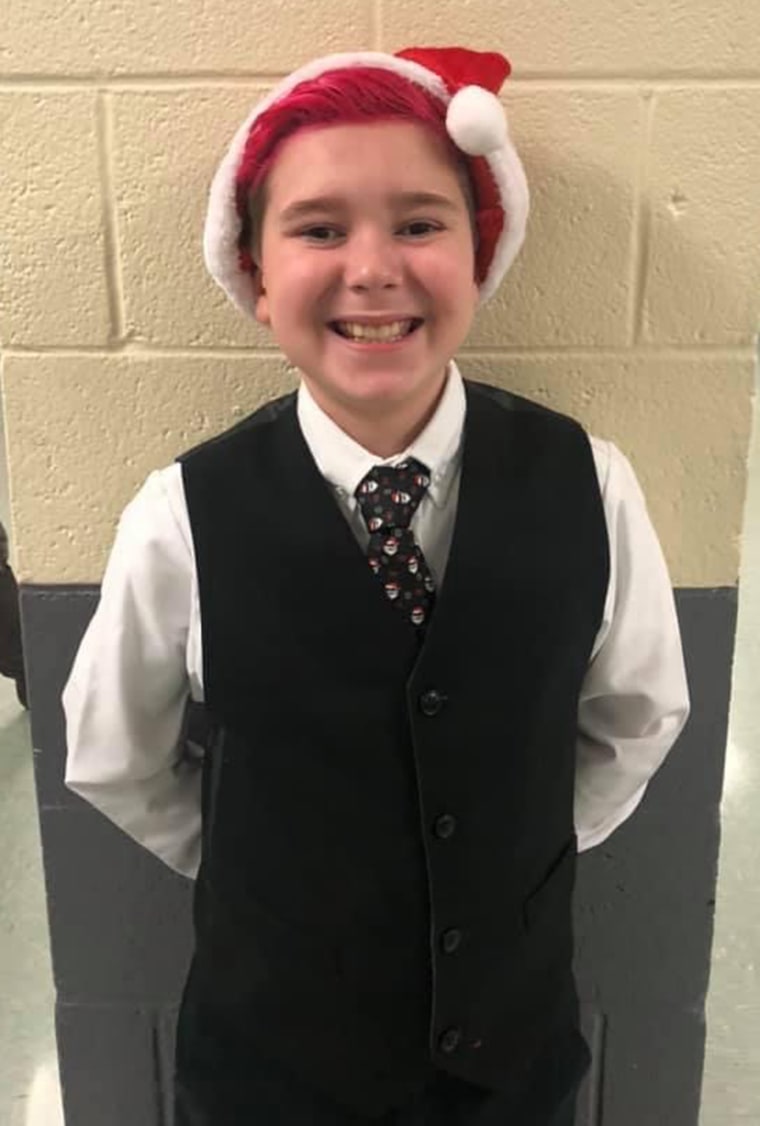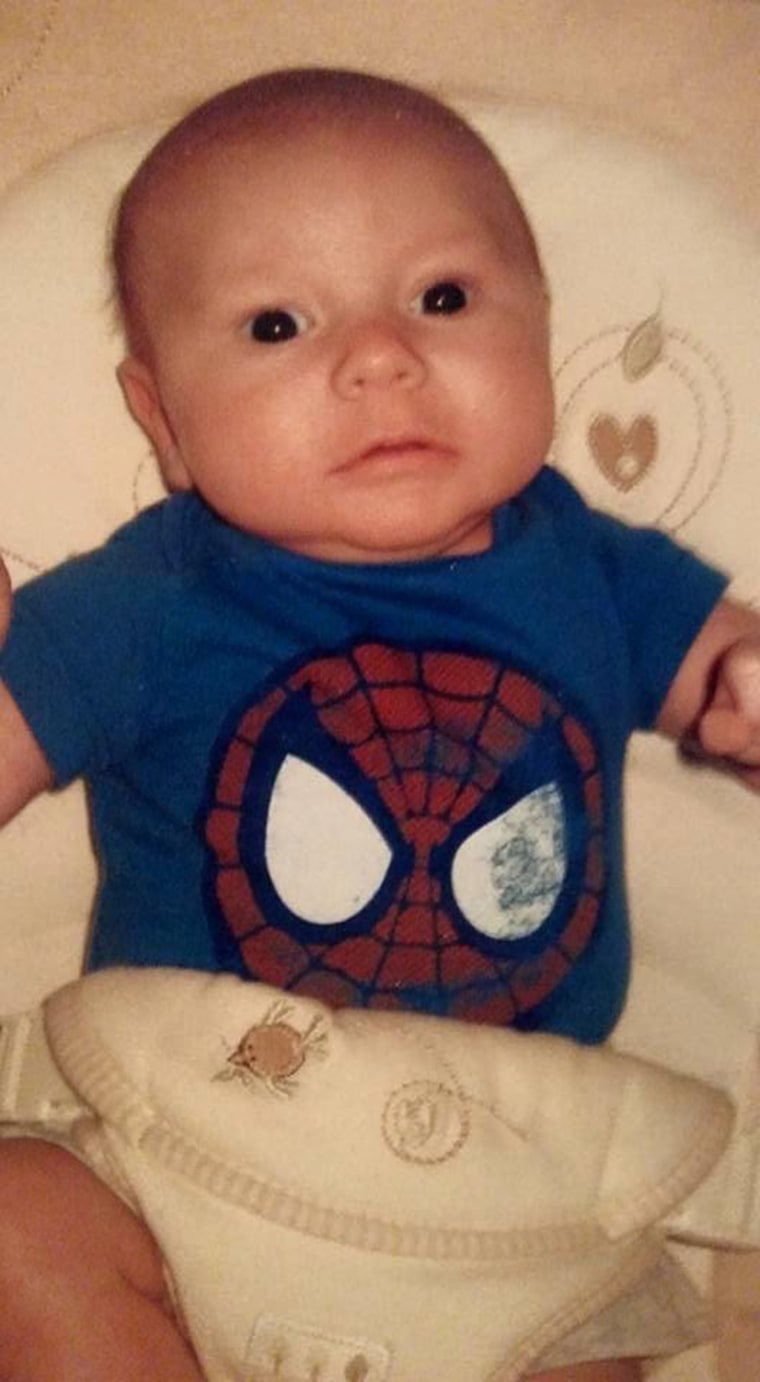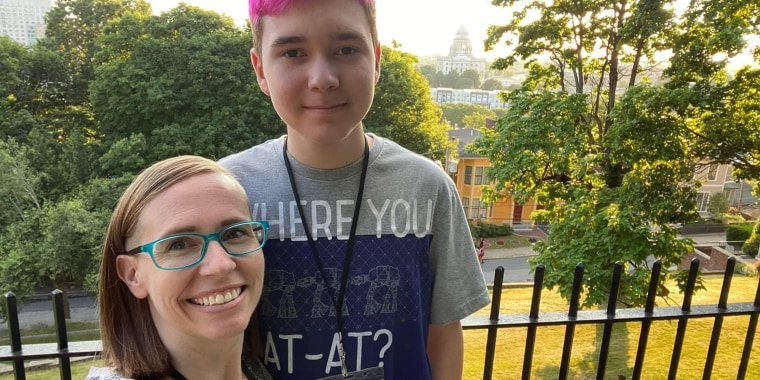When Christina Fleagle’s son Peyton was 18 months old, she noticed red scales on his skin. Soon after, he was diagnosed with ichthyosis, a rare condition that causes red or pink dry, rough scales on the skin. It grew to cover 95% of his body and caused such discomfort that Peyton sometimes scratched himself bloody at night. But they were offered little hope that he'd get better.
“Based off what we were told by our doctor, we thought it was so rare that there weren’t really many other people out there with it, and there wasn’t much else that we could do,” Fleagle, 37, of Agawam, Massachusetts, told TODAY. “We blundered along trying different lotions and oils.”

Recently, Peyton, now 12, participated in a clinical trial for a treatment for the condition, and the family joined a patient support group. After years of feeling alone, frustrated and helpless, Fleagle wanted to share their story to support others.
“As a young mother, not knowing what my child had and what it was going to lead to … was a little bit daunting. I was worried about what his future would look like, how bad would it get, if he was going to get bullied when he went to school and had scales,” she said. “It wasn’t until recently that we’ve really found out more about his actual skin and the community.”
Few options to treat ichthyosis symptoms
After Fleagle noticed that the red, scaly skin caused baby Peyton discomfort, they visited a dermatologist who diagnosed him with ichthyosis and added that “there’s not much we can do about it.”
“(He said) it’s really rare, and we’ll just try prescribing a different topical treatments,” she recalled. “He didn’t say it was worth getting the genetic testing done.”
Fleagle had noticed that some of her male relatives also seemed to have red scaly skin. At the time, she didn’t realize that undergoing genetic testing could have helped Peyton.
“In hindsight, we do wish we had the genetic testing done so we knew exactly what kind of ichthyosis he had,” she explained. “There are several different kinds, and each kind reacts to medications differently.”
Peyton tried topical steroids and eczema creams, but nothing really worked. They also cost a lot of money — “$700 for just one little toothpaste tube,” Fleagle said. The frustration they felt over the costly and ineffective medications caused the family to search for their own ways to soothe Peyton's skin.
“We just started trying to find our own lotions and ointments and oils that we thought would help keep his skin comfortable,” Fleagle said. “Nothing really stopped it from spreading.”

It started on his shins and moved upward onto his torso, arms, neck and scalp. The condition means that Peyton can’t sweat, so he can’t play sports or even hike for too long. In the winter, it can become so dry that his skin cracks and “feels almost like tissue paper.” Still, Peyton takes it in stride.
“I don’t really do much different because of it. Sometimes at home at night we apply lotion and some other things, like I don’t do sports or stay outside a lot because I can’t sweat,” Peyton told TODAY. “I’m lucky because I feel like I live a pretty normal life.”
Although, for much of his life, Peyton didn’t realize he was different than his friends, Fleagle said.
“He was just used to every single night we had to do lotions,” she said. “He went to school and asked another kid, 'What time does your mom come and lotion your entire body?' and the kids were like, 'What? We don’t do that.'"
Peyton also feels more physical pain than other children because of his ichthyosis.
“A lot of his friends enjoy Nerf gun fights. He doesn’t like Nerf gun fights because those little foam bullets hitting his skin really does hurt. He doesn’t like water balloon fights, anything like that,” Fleagle explained. “He definitely does have more sensitivity in his skin and (gets) overheated and tired more often. It’s definitely something we have to keep any eye on.”

Peyton also itches his skin, but he doesn’t always notice that he’s doing it.
“There’s been times where he’s woken up, and there’s been red patches where he’s just scratching so much that he starts to bleed,” Fleagle said. “He’s just always scratching, always touching his skin and scratching."
Connecting to community
Fleagle’s dad and uncle also had red, scaly skin, and she suspected that what Peyton had was hereditary.
“My dad would say, ‘Oh yeah, I have dry skin, but I don’t do anything about it,’” Fleagle said. “We’re pretty sure it’s what’s called X-linked ichthyosis, which means its linked to the X chromosome, and it’s passed down to the males in our family.”
Fleagle learned there was a group for people with ichthyosis — the Foundation for Ichthyosis and Related Skin Types (FIRST) — through her cousin who has two children with the condition. Through the organization, Peyton was able to enroll in a phase 2 clinical trial of a medication to treat ichthyosis. As part of that process, he received confirmation that he did have X-linked ichthyosis.
“We were blundering through about 10 years of his life where we knew he had something,” Fleagle said. “We now know so much more about it, the different kinds, how his ichthyosis affects him, what the actual symptoms are … what we can do to keep him comfortable.”
Petyon luckily hasn’t faced a lot of bullying about his skin, though his mom worried he would. He doesn't feel bad that he has the condition.
“I know it’s not my fault that I have this. That was entirely luck and genetic basis,” he said. “So why should I be upset about it?”
Peyton will be starting seventh grade. He enjoys video games, Dungeons & Dragons and is a Boy Scout. Scouting involves hiking, but he thinks being involved in the group builds his resilience.
“I feel like it makes me a little bit better at dealing with it,” he said. “Friends are really important in life, so I just enjoy spending time with them."

Fleagle and Peyton want others with ichthyosis to not have to endure the isolation and uncertainty they experienced.
“We felt very alone when Peyton was younger, and there were times where I felt hopeless as a parent that I couldn’t do anything for my child,” she said. “We’re hoping by sharing Peyton’s story and our family story that it might help people find resources to find the community that we wish we found sooner.”
